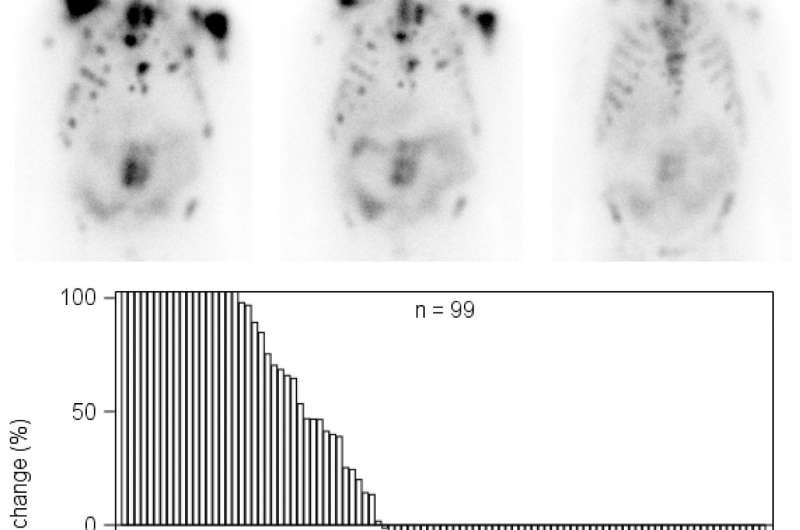New therapeutic agent proves more effective treatment for advanced prostate cancer

A German multicenter study, initiated by the German Society of Nuclear Medicine, demonstrates that lutetium-177 (Lu-177)-labeled PSMA-617 is a promising new therapeutic agent for radioligand therapy (RLT) of patients with metastatic castration-resistant prostate cancer (mCRPC). The study is published in the January 2017 issue of the Journal of Nuclear Medicine and is the featured article.
Prostate-specific membrane antigen (PSMA) is overexpressed in prostate cancer and even more so with castration-resistant disease. This makes development of new tracers for PSMA-targeted radionuclide therapies a promising treatment approach. Prostate cancer deaths are usually the result of mCRPC, and the median survival for men with mCRPC has been less than two years.
"Previous studies with small number of patients have indicated the high potential of this new therapeutic option," explains Kambiz Rahbar, MD, University Hospital Muenster. "This study of a large number of patients at multiple healthcare facilities, however, confirms the efficacy and safety of Lu-177-PSMA-617 radioligand therapy."
At 12 therapy centers across Germany, 145 patients (median age 73 years, range 43-88) with mCRPC were treated with Lu-177-PSMA-617 between February 2014 and July 2015 with one to four therapy cycles. A total of 248 therapy cycles were performed in 145 patients. Efficacy was defined by a prostate-specific antigen (PSA) decline of 50 percent or more from baseline to at least two weeks after start of RLT. Overall, 45 percent of patients had a positive response following all therapy cycles, while 40 percent responded after a single cycle.
Some adverse side effects were noted but manageable. Hematotoxicity occurred in 18 patients: 10 percent experienced anemia; 4 percent, thrombocytopenia (low platelet count); and 3 percent, leukopenia (low white blood cell count). Dry mouth was experienced by 8 percent.
The study shows that Lu-177-PSMA-617 radioligand therapy is safe and more effective than other third-line systemic therapies for mCRPC patients. Future Phase II and III studies are needed to clarify the survival benefit of this new therapy, which is not yet FDA-approved.
"This therapeutic will provide an additional therapy option for end-stage metastasized, heavily pretreated prostate cancer patients," said Rahbar. "While already demonstrating remarkably high response rates and low toxicity, in the future it may be available at earlier stages of disease with even higher response rates and lower toxicity."
More information: Kambiz Rahbar et al, German Multicenter Study InvestigatingLu-PSMA-617 Radioligand Therapy in Advanced Prostate Cancer Patients, Journal of Nuclear Medicine (2017). DOI: 10.2967/jnumed.116.183194


















